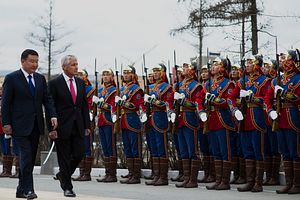U.S. Secretary of Defense Chuck Hagel finished his Asia tour with a brief stop in Mongolia, where he and Monglian Defense Minister Dashdemberal Bat-Erdene promised to increase military cooperation. Hagel praised Mongolia as a growing economic power and “a stabilizing influence in Asia.” In what might have been an indirect swipe at China, Hagel added that Mongolia “is seeking to modernize its military in a transparent fashion.”
Before the visit, J. Berkshire Miller outlined for The Diplomat why increasing defense cooperation was a goal for both the U.S. and Mongolia. For the U.S., improving ties with all regional players is an important part of the “rebalance to Asia” strategy. Further, Mongolia’s friendly relations with the U.S. and NATO (as seen through Mongolian participation in NATO mission from Kosovo to Afghanistan and Iraq) makes Mongolia an attractive partner in regional security for the United States. The U.S. also holds Mongolia up as a successful example of an Asian democracy, a point Hillary Clinton repeatedly made (to China’s dismay) during her 2012 visit to Ulan Bator. Given this, the U.S. is happy to help increase Mongolia’s say in regional security and economic affairs.
For Mongolia, increased interaction with the U.S. (including in the security realm) is an important part of the “third neighbor” policy, designed to help Mongolia move away from overdependence on China and Russia. Ulan Bator also has ambitions to become a more prominent diplomatic player. “Mongolia wants to be more than a passive observer in the international arena,” Bat-Erdene told the press during his meeting with Hagel. “We want to be actively engaged in international operations.”
During the visit, Bat-Erdene and Hagel signed a joint statement promising to strengthen military cooperation and increase joint training programs. The U.S. pledged to increase its military training and aid to Mongolia, currently valued at about $3 million a year. Mongolia welcomed U.S. support for its military modernization efforts, although Bat-Erdene ruled out the possibility of his country ever hosting a U.S. military base. Though Mongolia seeks to lessen its dependence on Russia and China, it also does not want to antagonize its larger neighbors.
The Mongolian Embassy’s website notes three particular areas where the U.S. is contributing to the development of the Mongolian Armed Forces: assisting in military training and the establishment of modern professional military education system; helping modernize the MAF, especially by enhancing its peacekeeping capabilities; and increasing Mongolia’s involvement in Asia-Pacific security affairs, including multilateral institutions and military confidence-building measures. The U.S. and Mongolia also have cooperated on a number of joint exercises, including the Gobi Wolf disaster management exercise and the annual Khaan Quest multinational peacekeeping exercise, which celebrated its 10th anniversary last year.
Hagel’s stop-over in Mongolia was brief—only four hours, according to Reuters. However, Hagel met not only with Defense Minister Bat-Erdene but also with Prime Minister Norovyn Altankhuyag. The Prime Minster told Hagel that defense cooperation was one of the pillars of the U.S.-Mongolia relationship, and said the government would support the goals discussed between Hagel and Bat-Erdene.
































